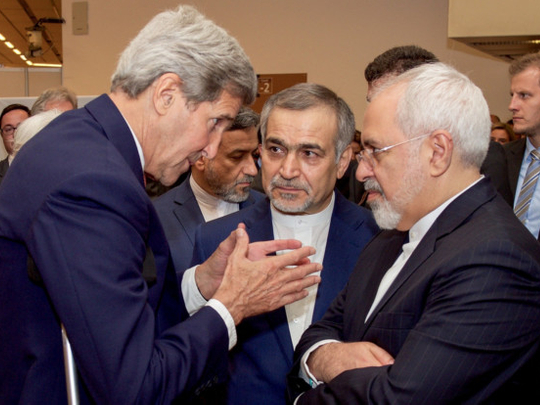
Commenting on the issue, Saudi Arabia’s Al Yaum said that the deal means that the world, and particularly the Middle East, will be facing a new phase of chaos and aggression, which Iran will most probably promote in the most creative manner.
“If the West and the Obama administration believe that this agreement is a step towards peace and exorcises the fears of war, then that is simply an illusion. The agreement has basically given Iran the legitimacy, power and finances to develop a nuclear weapon. This means that the agreement has made war more possible and peace impossible because the Iranian regime will utilise its wealth, relations and power to spread war, corruption and destruction. Prior to the agreement, when Iran was going through hard times and poverty, it spent most of its wealth creating sectarian sleeper cells in Iraq, Syria, Lebanon, Bahrain and Yemen. So how will Iran behave now that it will receive a gift of $100 billion in frozen assets?”
However, Oman’s Al Watan said that the agreement represents a new era in relations between Iran and the West. “The agreement will propel these relations into a phase of fruitful cooperation, mutual respect for interests and refraining from interference in [each others’] internal affairs. The agreement will also have a positive effect on the Iranian economy and currency, now that the country has managed to earn its right to develop nuclear technology and use it for peaceful purposes and is regaining entry into various global markets such as energy, oil, trade, tourism, industry, minerals and gold. In Vienna, Iran proved that the West only respects the powerful and only bows in the face of steely will. Despite the complaints of Israel and its allies and agents the following day, Omani diplomacy scored an impressive victory in Vienna as the country played the role of bringing those further apart closer together by giving sound advice and exerting all necessary efforts to ensure that both parties are willing to meet halfway.”
The pan-Arab newspaper Al Quds Al Arabi said that the deal will change the Middle East forever and will alter Iran’s global image. “On a regional level, the deal implies more than a nuclear programme or the lifting of sanctions; rather an implicit announcement on a level of cooperation that borders on a ‘strategic partnership’ between Iran and the West on a number of issues. Perhaps combatting terrorism might be one of those issues. Considering that Iran’s outlook was right regarding the international coalition’s failure in combatting Daesh (the self-proclaimed Islamic State of Iraq and the Levant), Tehran is now qualified to lead international and regional efforts against terrorism, thwarting terrorism from redrawing the Middle Eastern map in exchange for Iran [ending its interference] in the [internal affairs of countries in the] region, particularly in Syria, Iraq and Lebanon.”
The UAE’s Al Bayan said that until there are clarifications regarding the details about the nuclear deal and its commitment to the terms of the agreement, it is important to address the country’s intentions towards the region. “What the Arab region actively wants from Iran is a radical change in its policies; it must become a factor for stability in the region and distance itself from any military, social or economic threats. Iran has to be a partner in the region’s security and stability instead of being involved in many conflicts in Arab nations.”




_resources1_16a31069e4e_small.jpg)







